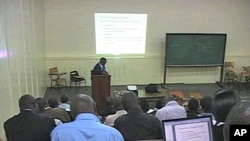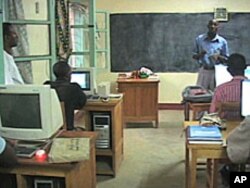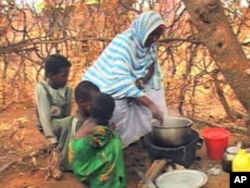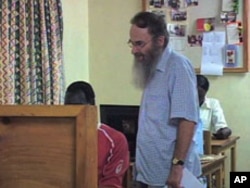A university education is not what you expect to get at a refugee camp in Africa. But it, indeed, is possible at a camp in northern Kenya.
Under such harsh conditions, obtaining a university degree seems like an impossible dream. But refugee students can get a degree at the Kakuma Refugee Camp in northern Kenya. The University of South Africa and the Jesuit Refugee Service have teamed up to offer bachelor degrees at the Kakuma Distance Learning Center.
Daniel Macharia, a tutor from Kenya, said, "They are given very good materials whenever the materials come, although the materials sometimes are late. When I compare the materials they are getting to the ones I used when I was in campus, theirs are very good materials. They are very explanatory and are easy to understand."
The curriculum is the same as at other distance learning centers, but these students face special circumstances. Homes in Kenyan refugee camps have no electricity or running water. Even food is in short supply. Computers are powered by generator or solar power available only during certain hours of the day. The heat also can be unbearable, and fighting occasionally breaks out in the camp or surrounding areas.
Macharia says students commonly do their homework in the center until about 8 p.m., then study in their makeshift homes with a paraffin lamp.
Reverend Chris Jenkins is education coordinator for the Jesuit Refugee Service's Kakuma Camp education program. He noted, "They can come virtually any time and study here. We provide the library, we provide some tutoring, and as best we can, we help with the Internet. Now as you can imagine, problems with power and Internet connection here are very great and so we are flexible with that, too."
Ababe Gelaw Mengistu graduated from Kakuma Distance Learning Center with a bachelor's degree in economics and sociology. He is now an administrative assistant at the center. "As a child I had a dream to be somebody, and my dream was cut short, which was not my choice. I felt like a shepherd who lost his sheep and I was totally empty. So when I got the paper, I feel as if I am just somebody," said Mengistu.
Current student Gessesse Temesgen said he is happy to resume his education. "I am specializing in development in politics and taking economics courses. These things can help me to have better opportunities. I am thinking (about) a job."
Twenty-one people have graduated from the Kakuma Distance Learning Center since its inception 11 years ago.
Reverend Jenkins says many of the graduates returned to southern Sudan following the signing of the north-south peace deal and have taken up high-level jobs in the southern Sudanese government.















